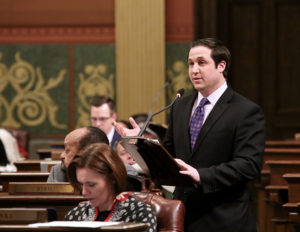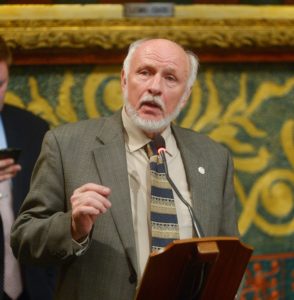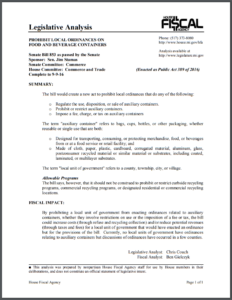
July 25, 2019 | Benjamin Apostle | Great Lakes now
Michigan has legislation on the table right now that would ban the ban of plastic bags ban, a situation that started during the 2016 lame duck session before Gov. Gretchen Whitmer took office.
Bans and restrictions on the use of plastic bags are widespread across the country and around the world. The rationale of the bag-banners is straight-forward: Plastic bags are non-biodegradable sources of pollution that scientists say could take hundreds of years, or even a millennium, to break down.
Americans use 100 billion plastic bags a year, according to the Center for Biological Diversity.
What’s more, according to Waste Management Inc., only 1 percent of plastic bags are returned for recycling, the rest ending up in landfills.
It’s a big contribution to the problem of plastic pollution in the Great Lakes, with around 10,000 tons of plastic entering the Great Lakes annually.
In August 2014, California became the first state to enact legislation imposing a statewide ban on single-use plastic bags. The regulation applies to larger retail stores, and also requires a 10-cent minimum charge for recycled paper bags, compostable bags and reusable plastic bags at certain establishments. Since then, only Hawaii and New York have joined California with statewide bag bans.
Michigan also has a ban relating to plastic bags, but not the one you might expect.
Michigan’s ban on bag bans
In the final days of 2016, former Michigan Lt. Gov. Brian Calley signed Senate Bill 853 into action while former Gov. Rick Snyder was on vacation. The bill, proposed by Republican Sen. Jim Stamas, banned the banning of plastic bags in Michigan, on the grounds that a plastic bag ban would create a patchwork of regulations that large corporations would have too much trouble complying with and small businesses could not afford.
With the direction food service is headed, plastic is a necessary precaution, said Connor Spalding, vice president of government affairs at the Michigan Restaurant and Lodging Association.
“Plastic bags prevent leaks, spills, and moisture damage while transporting certain food items during delivery, with more and more of the industry turning to DoorDash or Grubhub for food delivery,” Spalding said.
Spalding also said that plastic bags can be recycled, just not with your regular recycling bins.
“For example, I believe Meijer has a drop off area where you can bring your plastic bags for recycling,” Spalding said. The bag recycling program is part of Meijer’s Green Living initiative.
While more prevalent in coastal states, bag bans have not found much footing in the Midwest. Only two places in the Midwest: Evanston, Illinois, and the Cleveland suburb of Orange Village have plastic bag bans. Several other cities and counties such as Oak Park, Illinois, have passed bans that have yet to go into effect or have been pushed back, that would implement a tax on plastic bags to deter usage.
Michigan is not the only state to have implemented a ban on bans. Idaho, Arizona and Missouri all have similar laws in place. The arguments are the same, with proponents in those states defending them as a way of protecting businesses from having to comply with additional regulations.
Michigan’s ban on bag bans was spurred by an attempt to enact a ban in Washtenaw County. In early 2016, the Washtenaw County Board of Commissioners, which is seated in Ann Arbor, voted in favor of a new ordinance imposing a 10-cent fee on both paper and plastic bags dispensed in grocery stores throughout the county. The backlash from the Michigan Restaurant Association and other large businesses was significant enough to prompt Senate Bill 853.
Bipartisan ban on the ban on bans

State Representative Robert Wittenberg, Photo by housedems.com
Earlier this year, Rep. Robert Wittenberg, a Democrat, introduced and the movement to ban the ban on bag bans. Wittenberg introduced House Bill 4500 which would allow local municipalities to once again decide how they want to regulate plastic bags, or if they want to regulate them at all.
This would overturn the decision made in 2016, and essentially ban the banning of plastic bag regulations on a local scale.
“We aren’t trying to ban plastic bags. We aren’t trying to force any regulations on anyone in fact. We just want local municipalities to be able to decide for themselves,” Wittenberg said.

State Representative Gary Howell, Photo by gophouse.org
The bill does not require any local communities to ban plastic bags, merely giving them the option to do so. The bill has received bipartisan support from co-sponsor Republican Rep. Gary Howell.
“To me, this isn’t a partisan issue. I’m a strong advocate for local decision-making and local control, and the folks who are against this are the retailers,” Howell said.
Supporters of House Bill 4500 hope it gains traction in the coming weeks and months to put a dent in Michigan’s plastic bag consumption.
“It’s going to be a long slog,” Howell said. “But we have to keep the pressure on and fight for what is right for the people in these areas, not just let it be dictated from Lansing.”
3 Comments
-
Very well written, the article title was certainly a “gotcha”.
Nice article sir. -
Very good article clear and to the point. Thought provoking and keeps the readers interest all the way till the end.
-
I recently had the good fortune of reading your article on plastic bag bans and the politics surrounding the greed and regulations. It was well-written and very interesting. You pointed out several things that I will remember. I look forward to reading your next informative work. Thank you.






